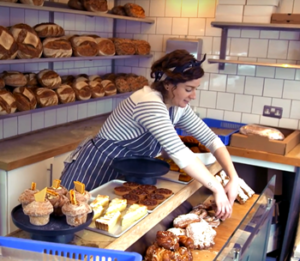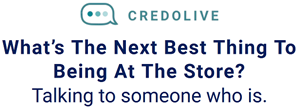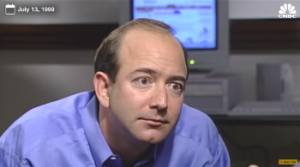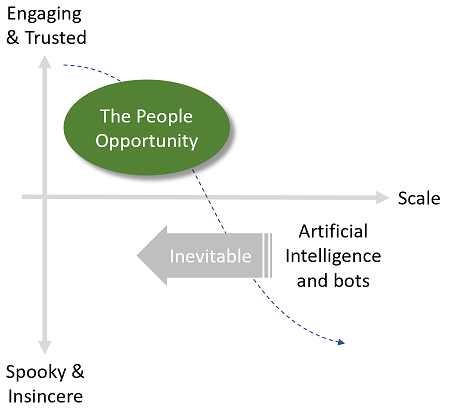 Martha has created a wonderful business in Sheffield (YouTube), and she has shared her adventurous journey with her friends and customers on social media. Forge Bakehouse is now a thriving business with a growing following (Facebook). Her enthusiasm is infectious! What’s not to like as you buy your three Pastéis de Nata? ForgeBakehouse is one great example of the growing number of artisan businesses that are beating the brands for customers and, crucially, customer loyalty by being engaged, sincere and trusted.
Martha has created a wonderful business in Sheffield (YouTube), and she has shared her adventurous journey with her friends and customers on social media. Forge Bakehouse is now a thriving business with a growing following (Facebook). Her enthusiasm is infectious! What’s not to like as you buy your three Pastéis de Nata? ForgeBakehouse is one great example of the growing number of artisan businesses that are beating the brands for customers and, crucially, customer loyalty by being engaged, sincere and trusted.
 In a very different sector, San Fransisco based Credo Beauty is using online services to offer face-to-face beauty consultations to customers away from the store. This gives them a solid differentiator in ecommerce from other vendors who are more transactional and mechanical, and it extends their reach beyond their business premises.
In a very different sector, San Fransisco based Credo Beauty is using online services to offer face-to-face beauty consultations to customers away from the store. This gives them a solid differentiator in ecommerce from other vendors who are more transactional and mechanical, and it extends their reach beyond their business premises.
How big can we go?
Human interaction and engagement is fiendishly hard to scale up, people being the way they are. Martha is doing well and has a growing team (see Martha’s crowdfunding here), but it gets harder the bigger and more spread out the team becomes. I managed five annual doublings of the team in my business, getting to 265 people in fourteen locations around the world, and that kind of thing is not for the faint hearted.
Can we make our people more cost effective?
 Of course, some big organisations and sectors already have seriously big teams and still think of themselves as “people businesses”. We know who they are: consulting companies, call centres and the like. Many of them are on a mission to use AI and machine learning, bots and robots to……. in many cases they’re simply looking for a way to reduce the number of people they need. Small teams are looking at ways of mechanising, too; think robotics in medicine (HBR). DirtyLemon will interact with you 24×7 and let you order by text message if you’ve registered your details, but that’s a bot and where’s the fun in that?
Of course, some big organisations and sectors already have seriously big teams and still think of themselves as “people businesses”. We know who they are: consulting companies, call centres and the like. Many of them are on a mission to use AI and machine learning, bots and robots to……. in many cases they’re simply looking for a way to reduce the number of people they need. Small teams are looking at ways of mechanising, too; think robotics in medicine (HBR). DirtyLemon will interact with you 24×7 and let you order by text message if you’ve registered your details, but that’s a bot and where’s the fun in that?
We apologise for any inconvenience caused
The trouble is that synthesising humans often ends up being, well, synthetic. Most people have had fun with Siri or Alexa but that soon loses entertainment value (they’re smart microphones, by the way, not smart speakers). These mechanical answers lack sincerity and can so easily end up feeling spooky. I gather that bots seem more human if they’re made to be slightly argumentative; what a comment that is! Sincerity is crucial and this usually gets devalued as it’s dished out in volume. We’re all familiar with those cynical, mechanical sounding expressions of sincerity, like: “Your call is important to us”, “Passionately committed to customer service”, and “Proudly serving our customers”. Personally, I find that these really grate and produce the opposite emotion from the one intended.
Don’t tell me you’re funny, tell me a joke

Of course the best companies don’t tell you it’s what they do, and they don’t have to. I’m not going to apologise for this, but once again I’d suggest that you really should watch this 1999 interview. (YouTube) It’s clear that Amazon is driven hard and with passion, and they don’t often get it wrong despite their huge scale. They are reaping the rewards for it. Their approach to customer service has influenced so much of the way businesses act now, or try to. It’s customer service, alright, but not engagement, and I do get annoyed when Amazon throws ads at me for things that I’ve looked at, when I’m nowhere near any Amazon page. It shows how their eyes follow you everywhere, which is creepy and intrusive.
 Human replacement is coming to a business near you
Human replacement is coming to a business near you
The novelty of all this mechanisation has largely worn off now, and it’s becoming clear what direction things are taking. Smaller, artisan businesses like Forge Bakehouse have a great differentiator in their people and passion. There are constraints for them if they grow but many don’t want to and actually few can grow sucessfully beyond a certain point. Excellent organisations like Amazon are showing what mechanisation can do at scale to replace humans and personalise what they do for their customers, and AI and robotics is a really hot space. It’s inevitable that these techniques will find their way into smaller and smaller businesses, further and further displacing people. It’s only a matter of time before automation and mechanisation are commonplace.
I’ve written elsewhere about the capacity that humans have to be the ultimate differentiator in business, and we can now see that many sectors will bifurcate into the two core propositions of customer engagement: the mechanised, and the human. You can see this starting to unfold. Supermarket checkouts are well on the way to being mechanical, and Amazon is there already (CNN). Train tickets, Police, doctor appointments, all manner of services are getting de-humanised.
 The food industry is due another revolution
The food industry is due another revolution
John Thornhill of the FT argues in his persuasive article that data-rich food delivery companies will know their customers far better than a restaurant ever can, and this will create upheaval in the food service industry. Uber Eats and many more are eager to push into any area that can be exploited at scale, so he’s almost certainly right for some kinds of food and customers. McDonalds is buying a lot of technology including AI to automate drive-thru. In the meantime, artisan businesses have a real differentiator in their people, the human interaction with their customers, and trust – that holy grail. As automation and mechanisation become the norm, that difference will stand out more, for more people, in more sectors. When de-humanisation comes to town, there’s a big opportunity for entrepreneurs to build teams and lead them to offer that trusted human engagement to customers.
Yes, but
What innovators have to get to grips with, particularly those in tech, is: how? How can we bring human engagement into the mix to add value for customers and everyone else? Probably something to explore here. Ideas anyone?
Meantime, Pastéis de Nata anyone?

Also:
Blog The Good, The Bad, and The Surreptitious
Blog We need to talk about losses
Blog WhatsApp scuppers the B2B market
Blog Are humans the ultimate differentiator?
and Interesting Reading
Peter is chairman of Flexiion and has a number of other business interests. (c) 2019, Peter Osborn
